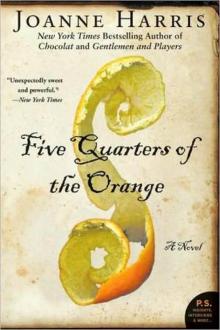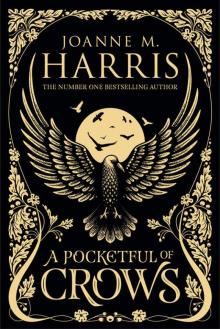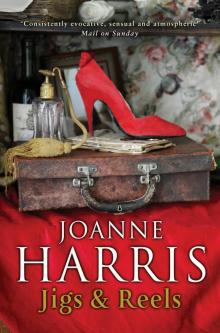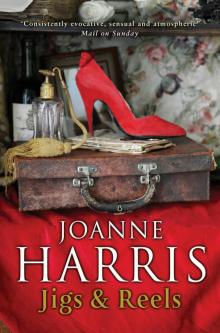- Home
- Joanne Harris
Holy Fools Page 3
Holy Fools Read online
Page 3
We toured the coastal cities and towns, never staying in one place long enough to attract unwelcome attention. We were often hungry, shunned by all but the poorest and the most desperate, denounced from pulpits across the country and blamed for every misfortune from drought to apple rot, but we took our happiness where we could, and we all helped one another according to our skills.
When I was fourteen we scattered, our caravans burnt by zealots in Flanders amid accusations of theft and sorcery. Giordano fled south; Gabriel made for the border; and my mother left me in the care of a little group of Carmelites, promising to return for me when the danger was past. I stayed there for almost eight weeks. The sisters were kind, but poor—almost as poor as we ourselves had been—and they were for the most part frightened old women, unable to face the world outside their order. I hated it; I missed my mother and my friends; I missed Giordano and his books; most of all I missed the freedom of the roads. No word had come from Isabelle, for good or for ill. My cards showed me nothing but a confusion of cups and swords; I itched from the crown of my cropped head to the soles of my feet, and I longed more than anything to be away from the smell of old women. One night I ran away, walked the six miles into Flanders and lay low for a couple of weeks, living on scraps, hoping to hear news of our company. But by then the trail was cold; talk of war had eclipsed everything else, and few people remembered one group of gypsies among all the rest. In despair I returned to the convent, but found it shut, and a plague sign on the door. Well, that was the end of it. With or without Isabelle, I no longer had a choice; I had to move on.
And so it was that I found myself alone and destitute, living perilously and poorly from theft and scavenging as I made my way toward the capital. For a time I traveled with a group of Italian performers, where I learned their tongue and the rudiments of the commedia dell’-arte. But the Italianate trend was already losing its popularity. For two years we lived indifferently until my comrades, discouraged and homesick for the orange groves and the warm blue mountains of their native land, decided to return home. I would have followed them. But maybe it was my demon prompted me to remain, or maybe the need to stay on the move. I made my farewells and, alone, though with money enough now for my needs, I turned my face again toward Paris.
It was there that I first met the Blackbird. Named LeMerle for the color of his unpowdered hair, he was a firebrand among the languid gentlemen of the Court, never at rest, never quite in disfavor, but always on the brink of social disgrace. He was unremarkable to look at, preferring unadorned clothing and the simplest of jewelry, but his eyes were as full of light and shadow as trees in a forest, and his smile was the most engaging I had ever seen, the smile of a man who finds his world delightful, but absurd. Everything was a game to him. He was indifferent to matters of rank or status. He lived on perpetual credit and never went to church.
It was a carelessness to which I responded eagerly, seeing in it some reflection of myself; but we were nothing alike, he and I. I was a little savage of sixteen; LeMerle was ten years older; perverse; irreverent; irrepressible. Naturally, I fell in love.
A chick, hatching from the egg, will take as its mother the first object that moves. LeMerle pulled me from the street, gave me a position; most of all he gave me back my pride. Of course I loved him, and with the unquestioning adoration of the new-hatched chick. Love not often, but forever. More fool me.
He had a troupe of player-dancers, the Théâtre du Flambeau, under the protectorship of Maximilien de Béthune, later to become the Duc de Sully, who was an admirer of the ballet. Other performances too could be arranged, these not so public, and unsponsored—though not unattended—by the Court. LeMerle trod a discreet, perilous line of blackmail and intrigue, skating the parameters of fashionable society without ever quite falling to the lures cast to him there. Though no one seemed to know his real name I took him for a nobleman—certainly he was acknowledged by most. His Ballet des Gueux had been an immediate success, though condemned by some as impious. Unabashed by critics, he was so audacious as to include members of the Court in his Ballet du Grand Pastoral—with the Duc de Cramail dressed as a woman—and was planning even as I joined his troupe the Ballet Travesti, which was to prove the final straw with his respectable patron.
It flattered him at first, to have me at his feet; and it amused him to see how hungrily men watched me as I danced onstage. We performed, LeMerle’s troupe and I, in salons and theaters all over the city. By then, comédie-ballets were becoming fashionable—popular romances from classical themes, interspersed with long interludes of dance and acrobatics. LeMerle wrote the dialogue and choreographed the routines—adapting the script to allow for the tastes of each audience. There were heroic speeches for the dress circle; flimsily clad dancers for the ballet enthusiasts, and dwarves, tumblers, and clowns for the general public, who would otherwise have become restless, and who greeted our act with loud cheers and laughter.
Paris—and LeMerle—had improved me almost beyond recognition; my hair was clean and glossy, my skin glowed, and for the first time in my life I wore silks and velvets, lace and fur; I danced in slippers embroidered with gold; I hid my smiles behind fans of ivory and chicken skin. I was young; intoxicated, to be sure, by my new life; but Isabelle’s daughter was not to be blinded by frills and fripperies. No, it was love that blinded me, and when our ship of dreams struck aground, it was love that kept me at his side.
The Blackbird’s fall from grace was as abrupt as his ascendancy. I was never quite sure how it happened; one day our Ballet Travesti was all the rage, and then the next, disaster struck; de Béthune’s protectorship withdrawn overnight, players and dancers scattered. Creditors who had held back now moved in like flies. All at once, the name of Guy LeMerle was no longer spoken; “friends” were suddenly never at home. Finally, LeMerle narrowly escaped a beating at the hands of lackeys sent by the famously austere Bishop of Évreux and fled Paris in haste, having called in the few favors still outstanding and taking with him what wealth he could. I followed. Call it what you will. He was a plausible rogue, with ten years more experience than I, and with a fine coat of Court polish over his villainy. I followed; it was inevitable. I would have followed him to hell.
He was quick to adapt to the traveler’s life. So quick, in fact, that I wondered to what extent he was not, like myself, a soldier of fortune. I had expected him to be humiliated by his disgrace: at the very least, a little chastened. He was neither. From Court gentleman he transformed overnight to itinerant performer, shedding his silk for a journeyman’s leathers. He acquired an accent midway between the refined speech of the city and the provinces’ rough burr, changing weekly to suit whichever particular province we happened to be visiting.
I realized that he was enjoying himself; that the whole game—for this is how he recalled our flight from Paris—had excited him. He had escaped the city unharmed, having caused a series of impressive scandals. He had insulted a satisfactory number of influential people. Above all, I understood, he had goaded the Bishop of Evreux—a man of legendary self-control—into an undignified response; and as far as LeMerle was concerned, that alone was a significant victory. As a result, far from being in any way humbled, he remained as irrepressible as ever, and almost at once set about the plans for his next venture.
Of our original troupe only seven now remained, including myself. Two dancers—Ghislaine, a country girl from Lorraine, and Hermine, a courtesan past her prime—with four dwarves, Rico, Bazuel, Cateau, and Le Borgne. Dwarves come in many shapes: Rico and Cateau were of childlike build, with small heads and piping voices; Bazuel was plump and cherubic; and Le Borgne, who had only one eye, was of normal proportions, with a sound chest and strong, well-muscled arms—or would have been, but for his absurdly short-ended legs. He was a strange and bitter little half-man, fiercely contemptuous of the Tall People, as he called us, but for some reason he tolerated me—perhaps because I did not pity him—and he had a grudging respect—if not a genuine liking—for
LeMerle.
“In my grandfather’s day it was worth your while to be a dwarf,” he would often grumble. “You’d never be short of food, at least; you could always join a circus or a traveling troupe. And as for the Church—”
Church people had changed since his grandfather’s day. Nowadays there was suspicion where once there might have been pity, with everyone trying to find someone to blame for their bad times and misfortune. A dwarf or a cripple was always fair game, said Le Borgne: and such undesirables as gypsies and performers made good scapegoats.
“There was a time,” he said, “when every troupe had a dwarf or an idiot, for luck. Holy fools, they called us. God’s innocents. Nowadays they’re just as likely to throw stones as to spare a crust for a poor unfortunate. There’s no virtue in it anymore. And as for LeMerle and his comédie-ballets—well!” He grinned savagely. “Laughter sits poorly on an empty stomach. Come winter, he’ll know that with the rest of us.”
Be that as it may, in the weeks that followed, we attracted three more players, members of a disbanded troupe in Aix. Caboche was a flautist, Demiselle a reasonable dancer, and Bouffon a onetime clown lately turned pickpocket. We traveled under the name of Théâtre du Grand Carnaval, performing mostly burlesque plays and short ballets, with tumbling and juggling from the dwarves, but though the entertainments were well received, they were for the most part indifferently paid, and for a while our purses were thin.
It was nearing harvesttime, and for some weeks we would arrive at a village in the morning, earn a little money helping a local farmer mow the hay or pick fruit, then in the evening we would perform in the courtyard of the nearest alehouse for what coins we could glean. At first LeMerle’s soft hands bled from the fieldwork, but he did not complain. I moved into his caravan wordlessly one night, he accepting my presence without surprise or comment, as if I were his due.
He was a strange lover. Aloof, cautious, abstracted, as silent in passion as an incubus. Women found him attractive, but he seemed mostly indifferent to their advances. This was not from any loyalty to me. He was simply a man who, already having one coat, sees no reason to go to the trouble of buying another. Later I saw him for what he was: selfish; shallow; cruel. But for a time I was taken in; and, hungry for affection, was content—for a time—with such small scraps as he was able to give me.
In exchange, I shared with him what I could. I showed him how to trap thrushes and rabbits when food was scarce. I showed him herbs to cure fevers and heal wounds. I taught him my mother’s cantrips; I even repeated some of Giordano’s teachings, and in that especially, LeMerle showed a keen interest.
In fact, I told him more about myself than I had intended—much more, indeed, than was safe. But he was clever, and charming, and I was flattered at his attention. Much of what I said was heretical, a mixture of gypsy lore and Giordano’s teachings. An earth—planets—moving about a central sun. A Goddess of grain and pleasure, older than the Church, her people unfettered by sin or contrition. Men and women as equals—at this he smiled, for it was beyond outrageous—but knew better than to comment. I assumed, in the years that passed, that he had forgotten. Only much later did I realize that with Guy LeMerle nothing is forgotten; everything is set aside for the winter, every scrap of information added to his store. I was a fool. I make no apologies. And in spite of what happened I’ll swear he had begun to care for me a little. Enough to cost him a pang or two. But not enough for me, when the time came. Not nearly enough.
I never learned his true name. He hinted it was a noble one—certainly he was not of the people—although even at the height of my infatuation I believed less than half of what he told me. He had been an actor and a playwright, he said; a poet in the style of the classics; spoke of misfortune, of ruin; grew elated at the memory of thronged theaters.
That he had been an actor I did not doubt. He had the gift of mimicry, a broad and winning smile, a certain flourish in his way of walking, of carrying his head, which spoke of the stage. His skills served him well—be it selling fake cures or bartering a winded horse, his powers of persuasion were little short of magical. But he had not begun his career as a performer. He must have studied; he could read Latin and Greek, and was familiar with several of Giordano’s philosophers. He could ride a horse as well as any circus equestrienne. He could pick pockets like a professional, and he excelled at all games of chance. He seemed able to adapt to any circumstance, acquiring new skills as he went, and however much I tried, I was unable to pierce the layers of fiction, fancy, and outright lies with which he surrounded himself. His secrets, whatever they were, remained his own.
There was one thing, however. An old brand high up on his left arm, a fleur-de-lis faded almost to silver over the years—which, when I questioned him, he dismissed with a smile and a claim of forgetfulness. But I noticed that he took care always to cover the mark after that, and I drew my own conclusions. My Blackbird had lost feathers in that encounter and did not care to be reminded of it.
6
JULY 10TH, 1610
I have never believed in God. Not in your God anyway; the one who looks down onto his chessboard and moves the pieces according to his pleasure, occasionally glancing up at the face of his Adversary with the smile of one who already knows the outcome. It seems to me that there must be something horribly flawed in a Creator who persists in testing his creatures to destruction, in providing a world well stocked with pleasures only to announce that all pleasure is sin, in creating mankind imperfect, then expecting us to aspire to perfection. The devil at least plays fair. We know where he stands. But even he, the Lord of Deceit, works for the Almighty in secret. Like master, like man.
Giordano called me pagan. To him this was no compliment, for he was a devout Jew, believing in a heavenly reward for his earthly sufferings. To him, to be pagan was to be immoral, ungodly, to indulge freely in the pleasures of the flesh, to delight too frequently in the other hazards encountered on the road. My old teacher ate sparingly, fasted regularly, prayed often, immersing himself for the rest of the time in his studies. He was a good companion—our only grievance was that on his Sabbath he refused to help with the work around the camp, preferring to go without a fire, even on a winter’s night, than to take the trouble to light one. Apart from this peculiarity, he was just like the rest of us; and I never saw him eat the flesh of children, as the Church claims his people do. In fact he rarely ate any kind of flesh at all. Which simply goes to show how misguided the Church can be.
Perhaps Giordano was misguided too, I told myself, as I strove dutifully to be more like my mentor. His Jewish God seemed so very like the Catholic God—which One True Religion seemed to me almost indistinguishable from that of the Huguenots or the Protestant heretics in England. There must be something else, I told myself repeatedly; something beyond sin and solemnity, dust and devotions; something that loved life as indiscriminately as I did.
My thirteenth birthday brought a kind of awakening. All that summer was a languorous procession of delights: a new awareness, a boundless energy, a heightened sense of taste and smell. For the first time, or so it seemed, I really noticed the flowers along the roadside; the scent of night falling by the seashore; the taste of my mother’s new bread, baked black in the coals but tender inside the crust of ash. I noticed too the delicious friction of my clothes against my skin, the icy splash of stream water as I bathed…If this was to be pagan, then I wanted more of it. The world had become maternal almost overnight, and her mysteries were boundless. I opened myself to her initiations. Every shoot, every flower, tree, bird, creature filled me with tenderness and joy. I lost my maidenhead to a fisherman in Le Havre and the world exploded in a revelation no less momentous to me than that of Saint John.
Giordano shook his head sourly and called me shameless. For a while he taught me nothing but theology so that my head spun and I rebelled, demanding the return of my history lessons, my astronomy, my Latin, my poetry. For a while he resisted me. I was a savage, he told me with disapprov
al, little better than the natives of newly discovered Quebec. I stole his books and pored over Latin erotica, my fingers following the script with agonizing slowness. When winter came my senses froze and my teacher forgave me, resuming our studies with his habitual sour shake of the head. But secretly, pagan I remained. Even in the abbey I am happier in the fields than in the chapel, the burn of my working muscles a kind of remembrance of that summer when I was thirteen and ungodly.
Today I worked until my back ached. When no more could be done among the herbs and vegetables, I moved to the salt flats, regardless of the sun’s glare, my skirt kilted to my knees, ankles mired in rime and mud. At the abbey we have lay folk to do the heavy work, the fishing, slaughtering of cattle, curing of leathers, and work in the salt fields, but I’ve never been shy of hard labor, and it keeps the fear at bay.
There is no word yet from Rennes, and last night my dreams were terrible, a nightmare hand of flung cards with LeMerle’s face on every one. I wonder whether I have brought these visions upon myself by writing so much about him in my journal, but the tale, now begun, is a runaway colt beneath my hands. Hopeless to try to break it now; better to hang on and let it run itself to exhaustion.
Janette taught me to value my dreams. They are like waves, she told me, of the tides that bear us, from which strange jetsam may be gathered, strange eddies from the deeps for those to read who can. I must use my dreams, not fear them. Only a fool fears knowledge.
Our first winter was the worst. For two months the Théâtre du Grand Carnaval was forced to a standstill just outside Vitré, a small town on the Vilaine. It had snowed throughout December, our money was almost gone, our food was running low, one of our caravans had lost a wheel, and there could be no hope of moving on until spring.
I think we all took it for granted that LeMerle would not beg. He was, he told us, writing a tragedy which, when performed, would prove to be the solution to all our problems. Meanwhile we scavenged, scrounged, danced, juggled, and tumbled ankle deep in the frozen refuse of the streets. The girls earned more than the men—at times we rivaled even the dwarves, once their novelty had worn off. Le Borgne grumbled, as ever, and seemed to take this as a personal affront. LeMerle accepted what money we brought him as if he expected no less.

 The Evil Seed
The Evil Seed Gentlemen and Players
Gentlemen and Players A Cat, a Hat, and a Piece of String
A Cat, a Hat, and a Piece of String Different Class
Different Class Chocolat
Chocolat Five Quarters of the Orange: A Novel
Five Quarters of the Orange: A Novel A Pocketful of Crows
A Pocketful of Crows Runelight
Runelight Runemarks
Runemarks Jigs & Reels: Stories
Jigs & Reels: Stories Sleep, Pale Sister
Sleep, Pale Sister Holy Fools
Holy Fools The Testament of Loki
The Testament of Loki Peaches for Monsieur Le Curé
Peaches for Monsieur Le Curé Blueeyedboy
Blueeyedboy The Lollipop Shoes
The Lollipop Shoes Coastliners
Coastliners Jigs & Reels
Jigs & Reels Five Quarters of the Orange
Five Quarters of the Orange